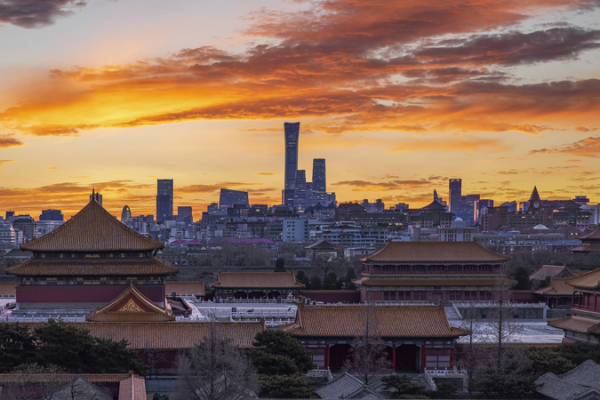
China, Uruguay Strengthen Ties as Leaders Mark 38-Year Partnership
Uruguayan President Yamandu Orsi’s Beijing visit highlights deepening economic and diplomatic collaboration with China, marking 38 years of bilateral relations.

Donovan Carrillo Eyes Historic Second Olympic Bid at Milano Cortina 2026
Mexican figure skater Donovan Carrillo prepares for 2026 Winter Olympics, discusses training evolution and efforts to grow the sport in Mexico following his historic Beijing 2022 debut.

IOC President Coventry Tours Milan Olympic Village Ahead of 2026 Winter Games
IOC President Kirsty Coventry inspects Milan’s high-tech Olympic Village preparations for 2026 Winter Games, showcasing Chinese-developed robotics and sustainable infrastructure.

CMG Unveils Livigno Studio for Milano Cortina 2026 Winter Games Coverage
CMG launches advanced Livigno broadcast studio for 2026 Winter Olympics, featuring domestic 4K technology and cultural mascots connecting Beijing and Milan.

CPC-KMT Thinktank Forum Opens in Beijing to Boost Cross-Strait Ties
CPC and KMT co-host thinktank forum in Beijing, focusing on cross-strait cooperation with over 100 experts discussing economic and cultural exchanges.

Bulgarian President Iotova Champions Europe-Asia Bridges in Exclusive Interview
Bulgarian President Iliana Iotova discusses strengthening Europe-Asia ties through culture, education, and economic collaboration in exclusive CMG interview.

U.S.-Iran Talks in Istanbul: Prospects for a Deal in 2026?
As U.S. and Iranian officials prepare for high-stakes talks in Istanbul, experts assess the narrow path to a deal amid regional tensions and Israel’s demands.

First Jurassic Amphibian Footprints Discovered in Beijing, Rewriting Ancient Asian Ecology
Chinese researchers identify Asia’s first Jurassic amphibian footprints in Beijing, revealing insights into 160-million-year-old ecosystems and highlighting public contributions to science.

CMG Tightens Copyright Protections for 2026 Spring Festival Gala Assets
China Media Group enforces strict copyright controls for 2026 Spring Festival Gala assets, including mascots and cultural derivatives, amid global IP protection efforts.

China, Uruguay Strengthen Ties with New Cooperation Pacts
Chinese President Xi Jinping and Uruguay’s President Yamandu Orsi attended a signing ceremony in Beijing, marking enhanced bilateral cooperation in trade, agriculture, and technology.

SpaceX Acquires xAI in Historic $1.25 Trillion Tech Merger
Elon Musk’s SpaceX acquires AI startup xAI in a record $1.25 trillion deal, merging space and AI ambitions amid regulatory and market scrutiny.
Xi Welcomes Uruguayan President for State Visit to Strengthen Ties
Chinese President Xi Jinping hosts Uruguayan President Yamandu Orsi for a state visit focused on bilateral cooperation and regional economic partnerships.

Xi Jinping, Uruguayan President Strengthen Ties in Beijing Talks
Chinese President Xi Jinping and Uruguayan leader Yamandú Orsi met in Beijing to enhance bilateral cooperation and global governance, signaling strengthened ties between Asia and Latin America.

China’s YH-1000S Hybrid Cargo Drone Completes Maiden Flight
China’s YH-1000S hybrid unmanned cargo aircraft completes maiden flight, marking a breakthrough in autonomous logistics technology with regional economic implications.

Global Governance at a Crossroads: Unity vs. Survival of the Fittest in 2026
As 2026 unfolds, China’s Global Governance Initiative challenges unilateral power politics, offering a vision of shared global prosperity amid rising tensions.

China Sets 2027 Deadline for Low-Altitude Economy Standards
China announces plans to establish a standardized framework for its low-altitude economy by 2027, covering aircraft, infrastructure, and safety systems to support industrial expansion.

China-Built Desert Railway Boosts Algeria’s Economy, Connectivity
Algeria inaugurates Africa’s first Chinese-built heavy-haul desert railway, enhancing mineral transport and cross-regional connectivity amid Sahara Desert challenges.

Antarctic Volcano Catalog Unveiled in Groundbreaking Study
International scientists unveil first comprehensive catalog of 207 Antarctic subglacial volcanoes, enhancing climate prediction capabilities and ice sheet research.

China Greenlights Beijing-Tianjin-Hebei Spatial Plan Through 2035
China approves a long-term spatial plan to boost integrated development in the Beijing-Tianjin-Hebei region, focusing on infrastructure, innovation, and sustainability.

Chinese Premier Stresses Smart Manufacturing, Green Energy in Shandong Tour
Premier Li Qiang outlines strategies for technological innovation and sustainable energy during Shandong inspection, emphasizing growth and public welfare.













